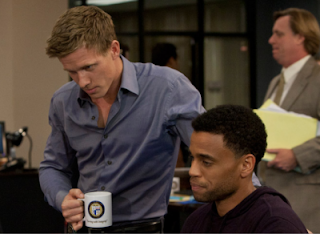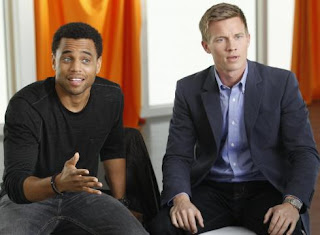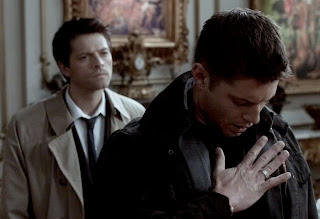When I heard that USA had a show coming
on called Common Law, where
two buddy cops had to go to marriage counseling to resolve their
differences, I really, really thought they were kidding. Because that
does not sound like a real show. No. That sounds like what the
internet says a show on USA would be.
But
it's a real show. A real, mediocre show.
It's
also really, how do I put this? Gay. It's super gay. And I've reached
the point where I'm pretty sure that's what they were going for.
Let's
look at the evidence:
In the
past couple of years, the buddy comedy has evolved from a couple of
bros talking about girls (Wedding Crashers),
to a bromance (Superbad).
Instead of getting men helping each other out with their woman
problems, now the "romances" are between men themselves,
focussed on the relationships that they share. And that's fine. Good,
even. I like movies that deal with loving friendship, and I enjoy
seeing men actually talk about their feelings.
But
there came a moment when I was watching Pineapple Express
and seeing Seth Rogen carry James Franco away from a burning
building, sans pants, that I thought, hang on a second. This is all a
little, well, intentional.
Like,
are the studios making bromances gayer because women like them?
I'm
not sure I'm cool with that.
I
believe in characters. They're what make stories work. Bromances,
buddy stories, those are male friendships based entirely on the
interactions between two characters. These characters need to be
strong and interesting for the partnership to be appealing and to
hold the audience's interest.
Just
like how I hate it when writers diminish female characters by giving
them only one personality trait, or defining them by their male
relationships, or whatever's pissing me off this week, I really hate
it when male characters aren't written well too. And when a bromance
is written with the express interest of enticing the female gaze,
that's not a whole lot better than a close female friendship being
written to appeal to the male gaze. Think about it.
There
are bromances that work outside of this framework. White
Collar is a good example, as
it's both borderline homoerotic (Peter chased Neal for years, finally
caught him, and now they enjoy a strangely close relationship that
amuses Peter's wife), but also very much a real friendship (Neal
sacrifices his own interests to help Peter and vice versa, Neal
befriends Peter's wife, Elizabeth, Peter befriends Neal's forger,
Mozzie).
It
works because while there is a homoerotic element, the characters
exist independent of that. It's clearly a show with a strong male
relationship that happens to stray into homoerotic territory
sometimes, and that's fine. The female characters on the show are
excellent, from the ever clever Elizabeth to Peter's partner, Diana
and her lovely girlfriend. The show is built on the relationships
between these people, so it never suffers.
Contrast
that with, say, Common Law.
Here, the characters are intended only as foils for each other and
titillations for the female gaze. They're both fit, attractive men,
who appeal to different demographics. One of them is a flirty playboy who lives outside of the rules and needs more structure in his life. The other one is a neurotic, tightly wound, mash of stereotypes. They don't have a clear bond,
or any real chemistry, but they are forced to make their partnership
work in the most homoerotic of ways: couple's counseling. This was a
plot point on Bones
too, remember. And that ended with Booth and Brennan having a baby.
The show's okay, not great or terrible, just a puddle of mediocrity, where the two male leads fluster and grimace their way through a plot contrived to make them appealing to women by hinting at the possibility of sexual interest. It's a form of objectification that I don't think we should be so easy to accept.
So I
don't hate bromances. I want to be clear on that. Sometimes they're
great, even with the extreme levels of homoeroticism involves.
Supernatural has, for
years, thrived on its female fanbase and the tickling possible
repressed bisexuality of one of its main characters (Dean), while
reveling in the "profound bond" that Dean shares with
Castiel, an apparently male angel. But this isn't an offensive
example because Dean and Cas' story is good whether you view it
sexually or not. The characters are so fully realized that even
occasional nods to the fans belief in their relationship come off as
organic, instead of painfully self-aware. And the hope that the two
of them will end the show in each others' arms isn't just a fangirl's
fantasy, it would make sense for the characters, too.
In the
end, it all comes down to characters. Do they make sense? Are they
well-written? And if you get rid of the outsiders gaze, is this a
story that's appealing to the gender about which it's written? Male
friendships should make sense to men, just like female friendships in
fiction should make sense to women. If we're going to be all het up
about one, then we have to care about the other.
No
double standards, and no external gaze. Just characters, story, and
friendships that feel real.
 |
| Also, you should watch White Collar. Because it's great. |






No comments:
Post a Comment